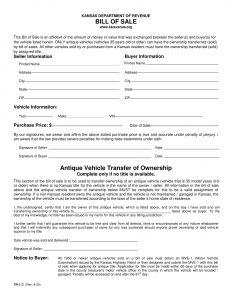Free Kansas Vehicle Bill of Sale Template
Is a Bill of Sale Necessary for Selling or Purchasing Vehicles in Kansas?
Yes, there are cases when a bill of sale is required. For instance, if a vehicle title doesn’t contain information about the price of the transferred asset. You’d need a bill of sale to register and title such a vehicle. Remember that a seller is responsible for completing and printing out the paper. Always demand this document from them to avoid disputes over the rights of ownership. If you are selling a vehicle, make sure to sign a bill of sale to transfer legal liability to a buyer.
According to the Kansas Department of Revenue, bills of sale signed within the state don’t require notarization to obtain legal value. Notary services may be needed if there is a lien involved. In addition, vehicles and trailers purchased and titled out of state need to go through a Motor Vehicle Examination (MVE-1). Mind that you may need to register a vehicle in Kansas even if you are not planning to obtain residency in the state, for instance, when borrowing a car from someone residing in a different state and using it in Kansas for 90 days.
Registration of Vehicles in Kansas: A Comprehensive Guide
Except for the above-described case, you need to register a vehicle within 60 days from the date of obtaining residency or completing the purchase. After you are done with the application, the title will be issued within a 10 to 40-day period. The following documents must be handed to the Treasurer’s Office to register a vehicle:
- MVE-1
- Kansas motor vehicle bill of sale form
- Vehicle title
- Title and registration fees
- Title and Registration Manual Application
- Applicant’s ID
A driver’s license issued in Kansas is necessary for registering a vehicle.
Other Vehicle Bill of Sale Templates
- alabama motor vehicle bill of sale
- az dmv bill of sale
- arkansas auto bill of sale
- ca dmv bill of sale
- colorado motor vehicle bill of sale
- ct dmv bill of sale form
- florida vehicle bill of sale
- georgia bill of sale for car
- idaho vehicle bill of sale
- illinois motor vehicle bill of sale form
- indiana auto bill of sale
- maryland vehicle bill of sale
- massachusetts car bill of sale
- michigan vehicle bill of sale
- missouri bill of sale for car
- nv dmv bill of sale
- nj motor vehicle bill of sale
- new mexico vehicle bill of sale
- nys dmv bill of sale
- nc bill of sale for car
- sc dmv bill of sale
- tn vehicle bill of sale
- texas vehicle bill of sale
- utah dmv bill of sale
- virginia vehicle bill of sale
- wa car bill of sale
